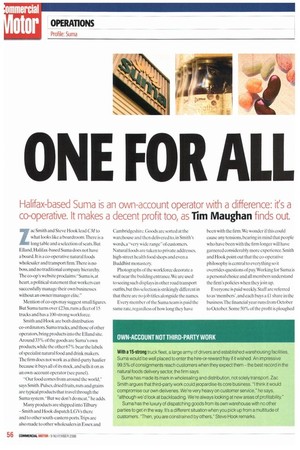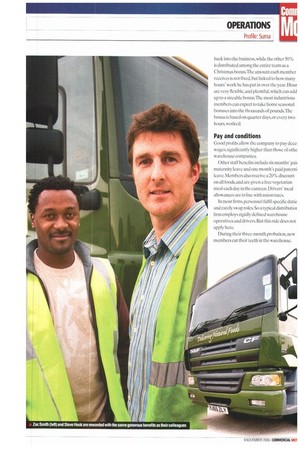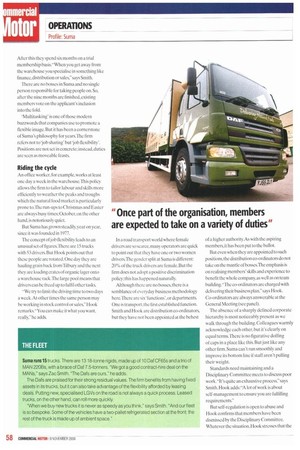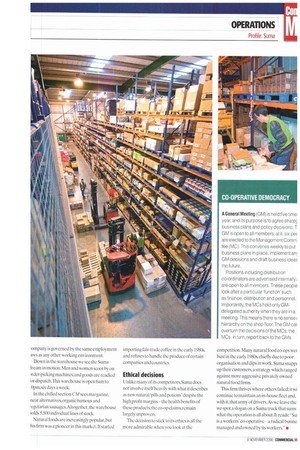ONE FOR ALL
Page 56

Page 57

Page 58

Page 59

If you've noticed an error in this article please click here to report it so we can fix it.
Halifax-based Suma is an own-account operator with a difference: it's a co-operative, it makes a decent profit too, as Tim Maughan finds out.
Zac Smith and Steve Hook lead CM to what looks like a boardroom.There is a long table and a selection of seats. But Bland, Halifax-based Suma does not have a board. It is a co-operative natural foods wholesaler and transport firm.There is no boss, and no traditional company hierarchy. The co-op's website proclaims: "Suma is, at heart, a political statement that workers can successfully manage their own businesses without an owner/manager elite."
Mention of co-ops may suggest small figures. But Suma turns over £23m, runs a fleet of 15 trucks and has a 100-strong workforce.
Smith and Hook are both distribution co-ordinators. Suma trucks, and those of other operators, bring products into the Elland site. Around 33% of the goods are Suma's own products, while the other 67% bear the labels of specialist natural food and drink makers. The firm does not work as a third-party haulier because it buys all of its stock, and sells it on as an own-account operator (see panel).
"Our food comes from around the world," says Smith. Pulses, dried fruits, nuts and grains are typical products that travel through the Suma system."But we don't do meat," he adds.
Many products are shipped into Tilbury — Smith and Hook dispatch LGVs there and to other south-eastern ports.Trips are also made to other wholesalers in Essex and Cambridgeshire. Goods are sorted at the warehouse and then delivered to. in Smith's words, a "very wide range" of customers. Natural foods are taken to private addresses. high-street health food shops and even a Buddhist monastery Photographs of the workforw decorate a wall near the building entrance, We are used to seeingsuch displays in other road transport outfits, but this selection is strikingly different in that there are no job titles alongside the names.
Every member of the Suma team is paid the same rate, regardless of how long they have been with the firm.We wonder if this could cause any tensions, bearing in mind that people who have been with the firm longer will have garnered considerably more experience. Smith and Hook point out that the co-operative philosophy is central to everything so it overrides questions of pay. Working for Suma is a personal choice and all members understand the firm's policies when they join up.
Everyone is paid weekly. Staff are referred to as 'members', and each buys a .f: I share in the business.The financial year runs from October to October. Some 50% of the profit is ploughed back into the business,while the other 50% is distributed among the entire team as a Christmas bonus-The amount each member receives is not fixed, but linked to how many hours' work he has put in over the year. Hour are very flexible, and plentiful, which can add up to a sizeable bonusTe most industrious members can expect to take home seasonal bonuses into the thousands of pounds.The bonus is based on quarter days, or every two hours, worked.
Pay and conditions
Good profits allow the company to pay decei wages, significantly higher than those of othe warehouse companies.
Other staff benefits include six months' pal( maternity leave and one month's paid paterni leave. Members also receive a 20% discount on all foods, and are given a free vegetarian meal each day in the canteen. Drivers' meal allowances are in line with union rates In most finns, personnel fulfil specific dutie and rarely swap roles. So a typical distributior lirm employs rigidly defined warehouse operatives and drivers. But this rule does not apply here.
During their three-month probation, new members cut their teeth in the warehouse. After this they spend six months on a trial membership basis. "When you get away from the warehouse you specialise in something like finance, distribution or sales," says Smith.
There are no bosses in Suma and no single person responsible for taking people on. So. after the nine months are finished, existing members vote on the applicant's inclusion into the fold.
'Multitasking' is one of those modern buzzwords that companies use to promote a flexible image. But it has been a cornerstone of Suma's philosophy for years."Ibe firm refers not to 'job sharing' but lob flexibility'. Positions are not set in concrete; instead,duties are seen as moveable feasts.
Riding the cycle
An off ice worker, for example, works at least one day a week in the warehouse. This policy allows the firm to tailor labour and skills more efficiently to weather the peaks and troughs which the natural food market is particularly prone to,Ilie run-ups to Christmas and Easter are always busy times; October, on the other hand, is notoriously quiet.
But Suma has grown steadily, year on year, since it was founded in 1977.
The concept of job flexibility leads to an unusual set of figures.There are 15 trucks with 53 drivers. But Hook points out that these people are rotated. One day they are hauling grain back from Tilbury and the next they are loading crates of organic lager onto a warehouse rack.The large pool means that drivers can be freed up to fulfil other tasks "We try to limit the driving time to two days week.At other times the same person may be working in stock control or sales," Hook remarks." You can make it what you want, really," he adds. In a road transport world where female drivers are so scarce. many operators are quick to point out that they have one or two women drivers:The gender split at Suma is different: 20% of the truck drivers are female. But the firm does not adopt a positive discrimination policy: this has happened naturally.
Although there. are no bosses, there is a semblance of everyday business methodology here:there are six lunct ions'„ordepartments. One is transpon, the first established function. Smith and Hook are distribution co-ordinators, but they have not been appointed at the behest of a higher authority. As with the aspiring rnernbers.it has been put to the ballot.
But even when they are appointed to such positions, the distribution co-ordinators do not take on the mantle of bosses.The emphasis is on realising members' skills and experience to benefit the whole company,as well as on team building:' I he co-ordinators are charged with delivering their business plan." says Hook. Co-ordinators are always answerable at the General Meeting (see panel).
The absence of a sharply defined corporate hierarchy is most noticeably present as we walk through the building. Colleagues warmly acknowledge each other, but its clearly on equal terms.There is no figurative doffing of caps in a place like this. But just like any other firm, Suma can't run smoothly and improve its bottom line if staff aren't pulling their weight.
Standards need maintaining and a Disciplinary Committee meets to discuss poor work ,"It's quite an exhaustive process," says Smith. Hook adds:"A lot of work is about self-management to ensure you are fulfilling requirements."
But self-regulation is open to abuse and Hook confirms that members have been dismissed by the Disciplinary Committee. Whatever the situation. Hook stresses that the :ompany is governed by the same employment aws as any other working environment. Down in the warehouse we see the Suma iream in motion. Men and women scoot by on wder-picking machines, and goods are readied Or dispatch.This warehouse is open 6am to .0pm, six days a week.
In the chilled section CM sees margarine. neat alternatives, organic humous and regetarian sausages.Altogether, the warehouse tolds 5.500 individual lines of stock.
Natural foods are increasingly popular,but his firm was a pioneer in this market. It started importing fair-trade coffee in the early 1980s, and refuses to handle the produce of certain companies and countries.
Ethical decisions Unlike many of its competitors. Suma does not involve itself heavily with what it describes as new natural 'pills and potions' despite the high profit marginsthe health benefits of these products. the co-op claims, remain largely unproven.
The decision to stick to its ethics is all the more admirable when you look at the competition. Many natural food co-ops wer bust in the early 1980s, chiefly due to poor organisation and dips in work. Suma snappt up their customers, a strategy which ranged against more aggressive privately owned natural food firms.
This firm thrives where others failed: it wi continue to maintain an in-house fleet and, with it, that army of drivers.As we leave the we spot a slogan on a Suma truck that sums what the operation is all about. It reads:"Sui is a workers' co-operative a radical busine managed and owned by its workers." to






























































































































































































